Private John McNair Simpson

John McNair Simpson was born on 17 November 1883 in Low Road, Lisburn, County Antrim, the seventh of fourteen children of linen finisher John Simpson and his wife Mary (née Kidd). At the time of the 1901 Census he was living at 45 Wesley Street, Lisburn, with his widowed father and six of his siblings, and working as a flax comber. On 27 March 1906 he married Ann Jane Ross in the Lisburn Cathedral. The couple's first child, Jane, was born at 44 Pittsburg Street, Belfast, on 6 December 1908. At the time of the 1911 Census they were living at 34.2 Glasgow Street, Belfast, John working as a general labourer.
Simpson enlisted in the 6th (Inniskilling) Dragoons Service Squadron at the Old Town Hall, Belfast, on 10 April 1915 (No. UD/258). He gave his address as 42 Mountcollyer Road, his occupation as labourer, and his age as 29 years 5 months (two years less than his true age). He was described as having a heart and a dagger tattooed on his right forearm.
The Inniskilling squadron, which had been formed as divisional cavalry for the 36th (Ulster) Division, embarked for France on 6 October 1915. Simpson, however, remained with the reserves at Enniskillen. On 3 November 1915 he was transferred to the 17th Battalion, Royal Irish Rifles (No.1813), for the purpose of "more suitable employment". His military character was recorded as 'good'.
While with the 17th Battalion at the Ballykinlar camp, Simpson was rarely out of trouble. In four months he was punished five time for being absent without leave – his absences totalling 34 days.
On 8 July 1916 he embarked for France, where he was posted to the 13th (Service) Battalion, Royal Irish Rifles. Two months later, however, he fell ill, suffering from rheumatism. (Although a newspaper report at the time stated he has been gassed.) He was evacuated from Bailleul to Boulogne, and from there to the UK.
Simpson was posted to Tipperary, where twice more he was disciplined for being absent without leave. On 1 April 1917 he was posted to the 20th (Reserve) Battalion, Royal Irish Rifles, at Newtownards. More disciplinary offences followed. On 13 April he was awarded 14 days' confined to base and to forfeit 13 days' pay for falling out without permission on the line of march and remaining absent for 13 days. On 10 May he was awarded 7 days' detention and lost 12 days' pay for being absent for 12 days.
On 11 May he was transferred to the 3rd (Reserve) Garrison Battalion, Royal Irish Fusiliers at Bere Island, County Cork. On 16 August he was awarded 7 days' Field Punishment No.2 and to forfeit 4 days' pay for being absent off pass. On 7 September 1918 he was transferred to the Labour Corps (No.390420). He was posted to No.657 Home Service Labour Company.
On 21 February 1919 Simpson was demobilised and transferred to Class Z, Army Reserve. His military character was recorded as 'good'. He was awarded a pension due to rheumatism (myalgia), PUO (pyrexia of unknown origin) and trench fever, and DAH (disordered action of the heart), which were attributed to his military service. In February 1920 his level of disability was assessed at 30 per cent.
Following his discharge Simpson lived with his family at 9 Newfoundland Street, Belfast, and worked as a labourer. His second child, Joseph, was born on 19 April 1920.
Soon after, however, he was admitted to The Abbey Sanatorium, Whiteabbey, suffering from pulmonary tuberculosis. He died of the disease on 29 January 1921 and was buried in Dundonald Cemetery, Belfast. His widow was awarded a military pension, but died two years later.
Two of Simpsons brothers – Joseph and William – also served in the war, both in the Royal Irish Rifles. Joseph (No.18764), serving in the 11th Battalion, was killed in action in Belgium on 1 September 1916 when gas released by the British blew back on their own lines, causing 207 causalties in the battalion's A Company.

Lisburn Standard, 8 September 1916

Larne Times and Weekly Telegraph, 11 November 1916
This page last updated 12 August 2023.
